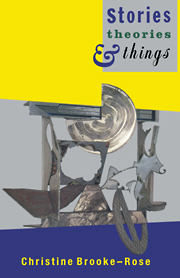Book contents
- Frontmatter
- Contents
- Preface
- Acknowledgements
- Part I Theories as stories
- Part II Stories and style
- Part III Theories of stories
- 10 Fiction, figment, feign
- 11 Which way did they go? Thataways
- 12 Palimpsest history
- 13 Illusions of parody
- 14 Illusions of anti-realism
- 15 A womb of one's own?
- Part IV Things?
- References
- Index
14 - Illusions of anti-realism
Published online by Cambridge University Press: 20 August 2009
- Frontmatter
- Contents
- Preface
- Acknowledgements
- Part I Theories as stories
- Part II Stories and style
- Part III Theories of stories
- 10 Fiction, figment, feign
- 11 Which way did they go? Thataways
- 12 Palimpsest history
- 13 Illusions of parody
- 14 Illusions of anti-realism
- 15 A womb of one's own?
- Part IV Things?
- References
- Index
Summary
If I have been cautious so far with the word ‘realism’, ‘anti-realism’ a fortiori carries worse risks. But much good work has been done on definitions in the past fifteen years, the most useful to me having been Narcissistic Narrative – The Metafictional Paradox by Linda Hutcheon (1980), Postmodernist Fiction, by Brian McHale (1987) and World-Games–The Tradition of Anti-Realist Revolt, by Cristopher Nash (1987), who themselves cite many others, and from whom I shall be quoting liberally. This chapter is a reconsideration and confrontation of their discussions from the viewpoint of a critic who is also a practising writer.
Realism
In the last chapter I quoted Graff, and part of McHale's reply, on the mimetism of ‘postmodern’ fiction, the argument being that the unreal reality it presents is in fact ‘not a fiction but an element in which we live’ (Graff 1979, 179). Similarly Newman says that ‘the vaunted fragmentation of art is no longer an aesthetic choice; it is simply a cultural aspect of the economic and social fabric’ (1984, 183, both quoted McHale, 219–20).
McHale's reply to ‘these serious charges’ is, first to point out the critics' parti-pris, but in addition, since as he admits this is not a rebuttal, to show that ‘postmodernism’ does in fact imitate (my italics) something other than ‘the unreality that modern reality has become’, that is,
postmodernism may be unrealistic, but anti-realism is not its sole object of representation. Indeed the favoured themes to which it returns obsessively are about as deeply coloured with ‘traditional’ literary values as anyone could wish. What could be more traditional than love and death?
220- Type
- Chapter
- Information
- Stories, Theories and Things , pp. 204 - 222Publisher: Cambridge University PressPrint publication year: 1991



